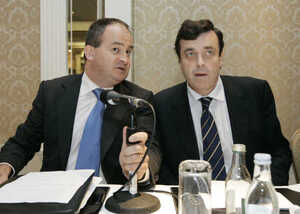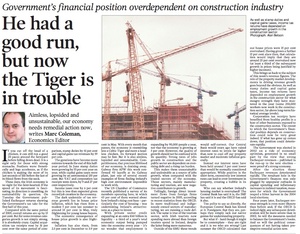
 (Dr Julien Mercille, top, and Marc Coleman above with Brian Lenihan at a Confidence In Media conference, 2010)
(Dr Julien Mercille, top, and Marc Coleman above with Brian Lenihan at a Confidence In Media conference, 2010)
You may recall UCD lecturer Dr Julien Mercille’s analysis of how the Irish media handled the housing bubble.
Among those Dr Mercille singled out for specific attention was Marc Coleman as he was economics editor of the Irish Times during the latter part of the boom
Mr Coleman responded on twitter that he had warned of an impending crisis and evidence of this was available if we had “bothered to check” the archives. He sent on this correspondence (a letter to the editor the Sunday Tribune in 2010), in which he defends his record as a commentator and analyst during the housing bubble.
Dr Mercille writes:
In April, Broadsheet.ie published articles about some work I have been doing on the media’s coverage of the housing bubble in Ireland, here and here. My point was that the Irish media supported the hype about the housing market and contributed to inflating the bubble that collapsed a few years ago, leading the country into a deep economic crisis.
One media commentator, Marc Coleman, formerly Economics editor at the Irish Times and now running his own radio show on Newstalk, wasn’t so happy about it, and responded to Broadsheet.ie (see above)
I decided to examine Coleman’s record on the housing bubble in more detail, and so I took a look at all the newspaper articles on the property market he has written since 2004 as well as his two books, The Best Is Yet To Come (2007) and Back from the Brink (2009).
Perhaps the clearest examples of how wrong he has been come from the following pieces. In September 2007, he attacked those who warned of a housing collapse like David McWilliams as ‘careless talkers’ who make meaningless ‘simplifications and generalisations’ and threaten to ‘run down our economy’.
Coleman claimed that ‘Far from an economic storm—or a property shock—Ireland’s economy is set to rock and roll into the century’. He thought the economy was so strong that he wrote that ‘Ireland enters the 21st Century in a position of awesome power’, which ‘promises a future more flourishing than ever before; a future that will turn economic prosperity from a statistical fact to a reality’.
Apparently, the country was doing so well that worldwide, ‘hundreds of millions of people are one the move, looking for a country like Ireland to make their home’. After all, ‘Far from collapsing, our economy and property prices will do more than hold up’. Supposedly, all we needed to do to protect ourselves against a crisis was not to talk about it, because ‘unless we talk ourselves into one, an economic storm is not going to happen.’ All we had to do is proceed as if there was no problem at all: ‘If we keep our eyes fixed forward and our heads cool, then the best is yet to come’.
Also, in March 2007, just as the housing bubble reached its peak, he wrote confidently that ‘Nothing exciting is in prospect for the market over the next two or three years, but nothing dangerous is in prospect either’. Later that month, he wrote that ‘some commentators on the property market… are predicting the downfall of the market, the collapse of the economy and the sky falling on our heads’. He said that those people were ‘talking nonsense’, and ‘dangerous nonsense at that’. He continued: ‘Doom merchants and indulgent parents are bad for the market’. He didn’t like those ‘irrational predictions of doom’ because he said ‘the market is correcting, not collapsing’ and in any case we shouldn’t worry because there is only a ‘modest amount of overvaluation in the market’ and ‘the safety nets for house price levels in 2008 are effectively already in place’.
But those are not his only contributions. He wrote a number of articles over the years that reinforced the notion that house prices were set to climb higher or, at worst, would gently stabilise in a ‘soft landing’. For example, he penned articles entitled ‘Housing Demand Set To Stay Strong’ (Irish Times, 28 September 2005), ‘Risk From Collapse in House Prices “Has Receded”’ (Irish Times, 2 November 2005) and ‘House Prices “Set for Soft Landing”’ (Irish Times, 22 November 2005). In another article, entitled ‘“Ryanair” effect adds to confidence in housing market’, he wrote that ‘The Irish housing market will experience another strong year, due in part to Ryanair making Ireland a more accessible place to work, according to Irish Intercontinental Bank (IIB) chief economist Austin Hughes’ (Irish Times, 25 January 2006). He presented another entertaining thesis in an article entitled ‘Legalisation of Contraception a “Major Factor” in House Price Rise’, reporting on a study entitled ‘Condoms and House Prices’ by Alan Ahearne of NUI Galway and Robert Martin of the US Federal Reserve Board (Irish Times, 1 May 2006). Another piece, entitled ‘Economists Forecast 15 More Years of Strong Growth’ (Irish Times, 23 March 2006), stated that ‘As a result of population growth, the number of houses is expected to continue growing by around 65,000 units a year until at least 2020’.
Later, he wrote an article entitled ‘Housing Market Set for “Soft Landing”’ (Irish Times, 28 February 2007) and stated reassuringly that ‘Negative equity is here—but only for a tiny percentage of the market’ (Irish Times, 14 June 2007). One could say that some of those articles were merely news stories and that Coleman was only reporting the opinion of others, but that confirms my point: he chose to report the views of those property ‘experts’ who were cheerleaders for the market, but ignored those who warned that it was in bubble territory, such as Morgan Kelly, David McWilliams, or The Economist magazine.
In January 2006, in the Irish Times’ Property section, Coleman advised his readers on how to buy property overseas. The article started thus: ‘Thinking of investing abroad? Don’t just check out the bars and the beach—research the economy of the country you’re buying in if you want it to be a good long-term prospect. Economics Editor Marc Coleman shows you how’. For example, he wrote that ‘The absence of serious political discord in a country is a necessary if insufficient condition to making a sound investment, in that it helps underpin confidence in the property market’.
In August 2006, he wrote the introduction to a Daft.ie report on the property market. In it, he claimed that the housing market’s ‘price resurgence is “fundamental” in nature’ and thus that it was ‘unlikely’ that ‘a downturn in the market [was] going to happen’.
In January 2008, Coleman encouraged his readers to buy property, writing that ‘provided you are not paying 2007 prices, 2008 could be an excellent year in which to buy’. Some might have wondered whether ‘you should wait until 2009 before buying a house?’ But Coleman said assertively that ‘that idea is nonsense’—as such, ‘many will this year have perfectly good reasons to buy houses in 2008 and—provided they pay 2006 prices—they should go ahead in confidence’. He believed that the property market would ‘bear out my prediction of a quick correction in 2008 followed by resumed growth’.
In March 2008, he wrote another piece entitled ‘Property: bottoming out—so it’s time to spend’. He minimised any worries about the market: ‘Less about a boom and bust, Ireland’s current economic story is more like a property bulge passing through the gullet of our economy’. He thought that by early 2009, ‘at the very latest, house price growth should turn very modestly positive’.
In October 2008, he attacked those who suffer from ‘illiterate panic-mongering’ and talk down the property market and who ‘with no quantitative discipline to back their statements, tell us that house prices are going to fall by another 40 per cent’—well, they’ve actually fallen by about 45% since then.
His optimism was displayed again in a January 2010 article entitled ‘All Signs Indicate We Are Turning the Corner on to Recovery’ (Sunday Independent, 10 January 2010) and in another one entitled ‘It’s Not “Hype”, the Worst Really Is Over’ (Sunday Independent, 7 February 2010) in which he wrote that ‘The armageddon brigade may argue otherwise, but the evidence suggests we are on the slow road to recovery’ and that ‘the signs of recovery are everywhere’.
A few of Coleman’s articles may appear to have warned against a housing crash, such as one entitled ‘Economy Vulnerable to Housing Crash’ (Irish Times, 4 March 2006), but in fact when one reads them, they turn out to have been reassuring about such an event, stating that ‘The good news is that, although possible, a crash is not yet probable’.
Coleman tried to defend his record in an article in the Sunday Independent in 2010, in which he gave examples of articles written by himself that purport to demonstrate that he had, in fact, warned us all about the impending collapse of the economy. However, none of his examples prove anything of the sort. All one can find are a few sentences saying that growth may not be sustainable, that credit is growing too fast, that the construction sector is a very large part of the economy, that the financial sector could be better regulated, etc. For instance, he says that ‘On March 31st 2006 in a piece that began “Stop the economy I want to get off” I warned that financial regulation had broken down’. The piece says that the economy is overheating, but doesn’t warn about a housing bubble.
Coleman also wrote a book entitled The Best Is Yet To Come, published in November 2007. It makes a number of economic assumptions that are simply wrong or irrelevant, such as arguing that a country’s climate and a coastal location help its economic performance: ‘Situated on the temperate if rainy north-west fringe of Europe, Ireland has one of the world’s most fortunate locations’ (pp.11-12). Another one is the book’s main argument, that population growth will stimulate economic growth in Ireland. As Colm McCarthy and Dan O’Brien have noted in their reviews of the book, that doesn’t make any sense, as on that count sub-Saharan Africa, India and other poor countries should be rich. To grow an economy, you need the right policies.
The book presents a very optimistic picture of the Irish economy. Coleman finished writing it in early October 2007, and by that time, signs of an economic slowdown were apparent. For example, he wrote that ‘At the time of writing, latest forecasts from the ESRI indicate that the so-called Celtic Tiger would expire in 2008’ and that housing construction would decrease.
But Coleman saw that as a mere ‘pause for breath’ on the part of the economy. In other words: ‘Ireland’s economic miracle is far from over. As anxiety mounts about the end of Ireland’s boom, The Best is Yet to Come argues that Ireland is not experiencing the beginning of the end, but rather the end of the beginning’, as stated on the book’s back cover.
There’s one line of defence that Coleman may use, and it goes something like this: ‘My predictions were conditional on the government doing this and that, and it didn’t do it, so I can’t be proven wrong’.
For example, in many of his articles and in his 2009 book, entitled Back from the Brink: Ireland’s Road to Recovery, he kept predicting that house prices wouldn’t fall too much or would stabilise soon, only to be constantly proven wrong by further falls in house prices.
But he then says that his predictions were conditional on the government cutting stamp duty or enacting some reforms. He even said that his predictions would materialise provided ‘the kamikaze commentators stop killing confidence’ (p.75). But that line of defence is worthless.
Anybody can predict anything and then blame the government or anybody else for not having done this or that, or not enough of this or that, or having done this or that, but not at the right time, or having done this or that, but not well enough, etc.
Julien Mercille is lecturer at UCD, and author of the forthcoming book, The Media and the Irish Economic Crisis: A Political Economy (Routledge).
Previously: For Those Who Shouted Stop He Salutes You
I Never Promised You A Rose Garden
(Mark Stedman/Photocall Ireland)
Update:
 Marc Coleman has defended his record on twitter, challenged Dr Mercille to a debate and has asked us to reprint this article from the Irish Times of July 6, 2006, which we are happy to do. Larger version here.
Marc Coleman has defended his record on twitter, challenged Dr Mercille to a debate and has asked us to reprint this article from the Irish Times of July 6, 2006, which we are happy to do. Larger version here.








